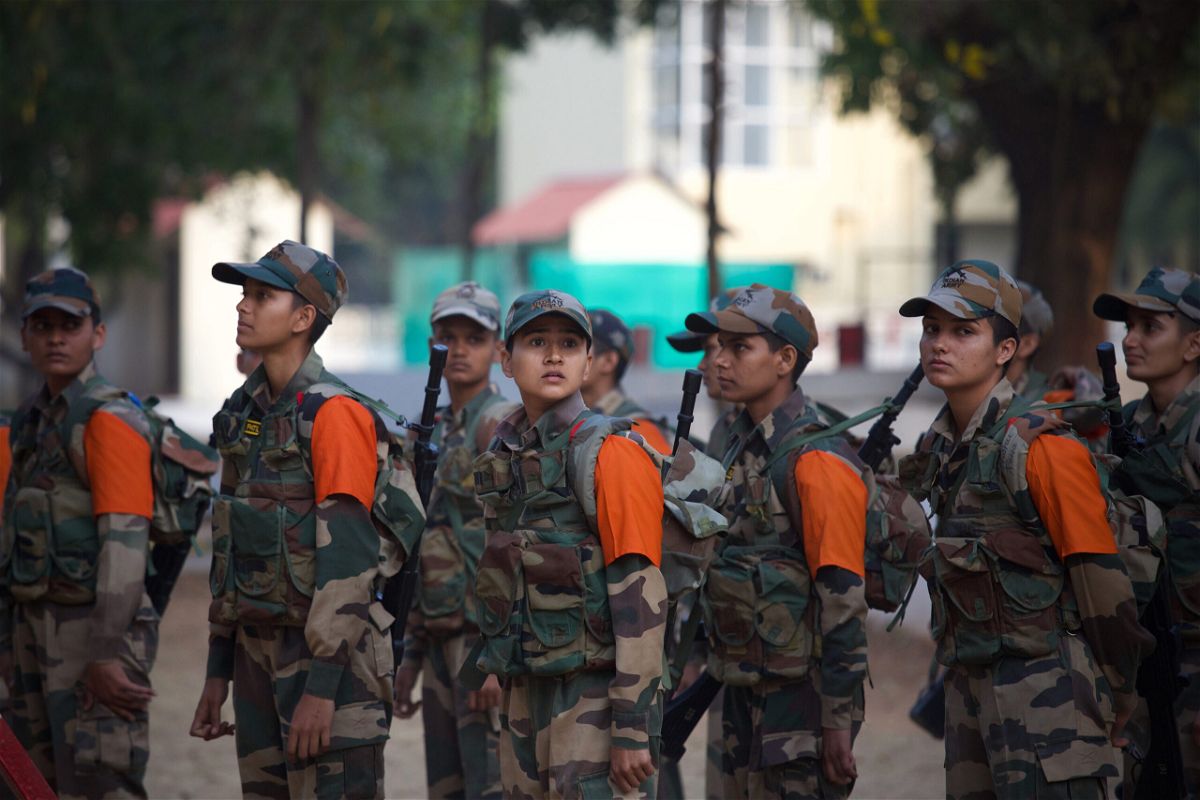India’s top court clears way for women to attend elite military academy

Female recruit soldiers from the Indian army wait during a media visit to the Corps of Military Police Centre and School on March 31 in Bengaluru
By Jessie Yeung and Swati Gupta, CNN
India’s Supreme Court has set a deadline for women to be admitted to the country’s elite defense academy for the first time next year, potentially opening the door for females to achieve high-ranking military positions in a field traditionally dominated by men.
The court first ruled in August that women would be allowed to sit entrance exams for the National Defence Academy (NDA), a highly selective institution that trains cadets for all three branches of the military — the army, navy and air force.
In response, the government requested the deadline be extended by a year, arguing it needed more time to prepare for incoming female students. For instance, it needed to create new health fitness criteria for female candidates, build additional dormitories, and adjust its intense physical courses for women, the government’s affidavit said.
On Wednesday, the court upheld its decision, ruling that women would be allowed to sit the exam in November — clearing the way for female students to begin attending the academy in 2022.
“The court said, ‘We have given hope to the girls and we cannot take that away. Just because you filed the affidavit that there are difficulties, we cannot take that hope away,'” said Chinmoy Pradip Sharma, one of the senior lawyers representing the petitioner.
The petition was filed by Kush Kalra, a Delhi-based lawyer, in 2020, but hearings only began this year.
Previously, women have been allowed to serve as officers and could attend other military schools — but they have long been blocked from the NDA. The prestigious academy has produced many of the country’s top military leaders, including all the current chiefs of staff in the army, navy and air force.
Women will still be largely excluded from combat — but with their inclusion into the NDA, they can aspire for higher positions like commanders, rather than be delegated to administrative work as is often the case. And their access to elite training at the academy could influence future arguments in favor of allowing women in combat.
Women make up a tiny fraction of India’s military — just 6.5% of the navy, 1.08% of the air force, and 0.56% of the army, according to CNN affiliate CNN-News18.
To put that in perspective, in 2020 women made up 23% of the cadets at the United States Military Academy, also known as West Point, which began allowing female students in 1976.
And until recently, Indian female officers could only be inducted into the army through “short service commissions” — meaning they can serve for just 10 to 14 years, and must leave their roles afterward.
But in recent years, change has come at a rapid pace, with the courts clearing a number of obstacles and pushing more women into the field.
In 2016, India’s air force enlisted women pilots for the first time, and in 2019, the navy welcomed its first female pilot.
Last year, the Supreme Court handed down a landmark ruling ordering the government to grant permanent commission and command positions to female officers in the armed forces.
That means female officers will be allowed to serve past 14 years — and makes them eligible for the same promotions, benefits and pensions as their male counterparts.
The changes are significant in a country where gender discrimination and inequality remains deeply entrenched. Women face often restrictive cultural norms, and comprised just over 20% of India’s total labor force in 2019, compared to 46% in the US.
Wednesday’s decision might not usher in a new era of female empowerment in the military, and it remains to be seen how the academy will implement co-ed measures. But the court’s ruling was hugely symbolic, suggesting a gradual shift to a more inclusive India. The ruling sent the message that “even if it is a small number of women who apply, you should make the effort,” the judges said in court Wednesday, according to Sharma, the lawyer.
“It is a victory for women,” he added. “In 2021, women are as good as men.”
The-CNN-Wire
™ & © 2021 Cable News Network, Inc., a WarnerMedia Company. All rights reserved.

